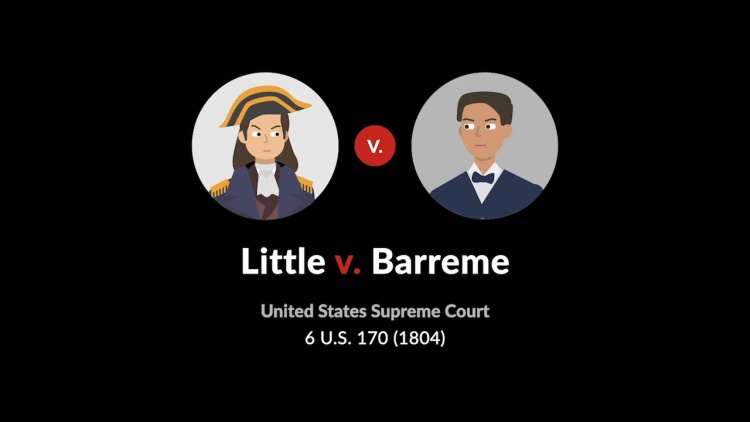Little v. Barreme
United States Supreme Court
6 U.S. (2 Cranch) 170, 2 L.Ed. 243 (1804)

- Written by Eric Cervone, LLM
Facts
During wartime with France, Congress passed a law suspending all dealings with the country. Section 5 of the act authorized the president of the United States to instruct commanders of armed ships to stop and examine any American vessel they had reason to believe was acting illegally under the law and seize it, but only if it appeared to be sailing to France. Because the language of the law as written by Congress, only allowing for seizure of a vessel sailing to France, would be fairly easy to evade, the president purported to give effect to the law through an executive order instead authorizing ship commanders to stop and search ships that were “apparently as well as really American,” that were travelling either to or from ports of France. This gave commanders the additional power not expressed in the original congressional act to seize ships that might secretly be American, even though they may have had Danish or other foreign papers, which were sailing from France. As a result of this order, Captain Little (defendant), a United States frigate commander, seized the Flying-Fish, a Danish vessel that Little suspected was actually an American vessel, as it was returning from a French port. The Danish ship’s owners (plaintiffs) sued Captain Little for trespass.
Rule of Law
Issue
Holding and Reasoning (Marshall, C.J.)
What to do next…
Here's why 907,000 law students have relied on our case briefs:
- Written by law professors and practitioners, not other law students. 47,100 briefs, keyed to 996 casebooks. Top-notch customer support.
- The right amount of information, includes the facts, issues, rule of law, holding and reasoning, and any concurrences and dissents.
- Access in your classes, works on your mobile and tablet. Massive library of related video lessons and high quality multiple-choice questions.
- Easy to use, uniform format for every case brief. Written in plain English, not in legalese. Our briefs summarize and simplify; they don’t just repeat the court’s language.





